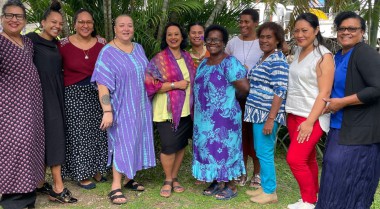
Regional Women Mediator Networks create an opportunity to boost intentional and meaningful women’s participation in peace and security
As the 2023 Annual UNSC Open Debate on Women, Peace and Security is fast approaching, it is worth highlighting the opportunity it presents to Member States to contribute to strengthening the modalities of women’s participation in conflict prevention and peacebuilding.
In its concept note for the upcoming open debate, Brazil highlights the establishment of regional women mediator networks as one modality for strengthening women’s participation in peace and security. It further emphasises the creation of the Global Alliances of Regional Networks of Women Mediators in 2018 as a positive step that brings Member States and civil society together to advance multi-stakeholder efforts on prevention and peacebuilding. A full list of existing women mediator networks can be found on the Global Alliance of Regional Women Mediator Networks website.
To be fully able to build on the opportunity presented by women mediator networks, Member States and local civil society require financial and operational support. To date, it remains however unclear what concrete steps can the UN System take – including the UN Security Council (UNSC), Peacebuilding Commission (PBC), and Agencies, Funds and Programmes (AFPs) – to meaningfully support (resource and operationalise) regional women mediator networks. Even the UN Secretary-General (UNSG) has refrained from making concrete commitments – and following up on existing commitments – to supporting regional women mediator networks since 2019, when the last UNSG’s report on Women, Peace and Security made concrete commitments to women mediator networks.
Why are women mediator networks critical to conflict prevention and peacebuilding?
Despite there being an absence of policy literature on women mediator networks, several UNSG reports do affirm their importance within the broader peacebuilding architecture:
Women mediator networks ‘form part of a movement aimed at enhancing the influence of women throughout the duration of peace processes, from conflict analysis to preventive diplomacy, and to peacemaking and post-conflict peacebuilding and reconciliation’ (S/2018/900, para. 39). ‘These networks are linked to growing global recognition of the need to go beyond approaches aimed only at “stopping the guns” towards processes that can help foster positive peace, a concept that includes accountable and inclusive governance, security from physical harm and full enjoyment of other inviolable human rights’ (S/2018/900, para. 41). ‘While such networks serve an important purpose, they should not become a parallel structure for women or entrench marginalization. Nor should they be focused only on the capacity-building of women, but rather on continued joint action and improved capacity of peace and security processes to be inclusive and responsive for all’ (S/2018/900, para. 41).
How do women mediator networks contribute to conflict prevention and peacebuilding?
Women mediator networks contribute to prevention and peacebuilding in a variety of ways. They:
- Provide ‘coordinated mobilisation’ to support women participants and observers in the negotiations of the peace agreements (S/2020/946, para. 25);
- Provide ‘advocacy and technical support’ to ensure full, meaningful and equal participation of diverse local women in peace processes (S/2019/800, para. 17);
- ‘Accelerate and monitor the women and peace and security agenda at the national and regional levels through increased information-sharing and collaboration (S/2019/800, para. 79);
- Make ‘progress in operationalisation of regional peacemaking efforts’ (S/2018/900, para. 40);
- Build ‘strong, open lines of communication between local communities and government institutions, including those involved in peace and security processes’ (S/2018/900, para. 41);
- ‘Provide a resource for linking knowledge and capacity across mediation efforts locally and globally’ (S/2017/861, para. 17; S/2016/822, para. 14).
What can Member States and the UN system do to meaningfully support women mediator networks?
During the 2023 UNSC Open Debate on Women, Peace and Security, Member States could remind the UN Secretary-General of commitments made previously to support women mediator networks and request action to:
- Multi-Stakeholder Partnerships: ‘Expand [the UN] partnerships with diverse women networks [...] in the next five to ten years’ (S/2020/946, para. 113) and contribute to building ‘stronger linkages between women-led mediation at the grass-roots and local levels and processes at the national and global levels’ (S/2018/900, para. 40). This will contribute to non-repetition of efforts at all levels and ensure that the UN technical advisors (e.g. UN Standby Team) and mediation leadership appropriate gender expertise.
- Effective and Resourced Women’s Participation: ‘Encourage all actors supporting mediation processes to persist in promoting women’s participation, in order to ensure that commitments continue to be met in this area’ (S/2016/822, para. 10) and ‘provide holistic support for women’s groups that are engaged in [all tracks of] diplomacy efforts’ (S/2015/716, para. 154). This includes enhancing thet raining for diverse women to engage effectively in peace processes. The UN partners could also commission gendered briefing papers, in partnership with women mediators networks, for all substantive themes that could arise in peace talks and peacebuilding processes. The UN and the donor community should further consider scaling up technical support to ensure the participation of women mediators, as well as innovative financing modalities that support the network approach to peacebuilding and conflict prevention.
